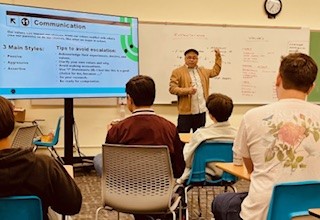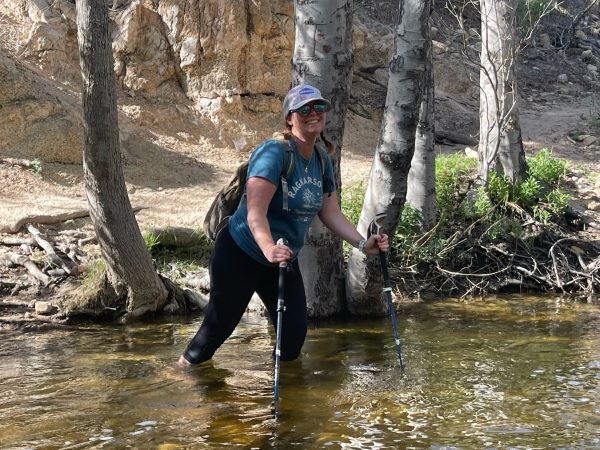Marc Pescadera, adjunct counselor at San Diego Mesa College said.“We’re here today to explore the intersections of identity and education, to embrace the diversity that shapes our journeys,” at a forum on Nov. 15 presented by the San Diego Mesa College
Marc Pescadera, adjunct counselor at San Diego Mesa College said.“We’re here today to explore the intersections of identity and education, to embrace the diversity that shapes our journeys,” at a forum on Nov. 15 presented by the San Diego Mesa College Asian American Native American Pacific Islander Serving Institution team.
The importance of the Mesa Transfer Center is highlighted; this resource stands as a dedicated support system for students navigating the transfer process. This office offers guidance and assistance and is a valuable asset for those considering or pursuing a transfer to further their educational journey. “We’re here today to explore the intersections of identity and education, to embrace the diversity that shapes our journeys,” Pescaderas said.
During his opening remarks, he asked, “Who in the audience considers themselves an introvert?” To the ones who raised their hands, he encouraged them to move to the front of the room, setting the tone for an engaging discussion on values, family expectations, and the power of collaboration in navigating the complexities of academia. The audience was asked to speak to at least one person in the room and ask about their expectations from family and friends. After a quick moment, the students were encouraged to share publicly. A first-year student in the audience said “I come from an immigrant family in a small village. You have to get straight A’s to go to university. This is not the case in the U.S., but my parents didn’t understand this.” Another first-year student said, “My parents want me to be a doctor or a lawyer to help support the family.” Pescadera asked, “How many of you have felt the weight of family expectations on your choice of major?” Pescadera followed up with, “Are your parents disapproving of your choice of major?” Many students nodded their heads and opened up about the internal conflicts they faced in pursuing their academic goals while seeking parental approval.
O*NET OnLine emerged as a versatile tool capable of exploring occupation reports. It offers a spectrum of information, ranging from broad overviews to comprehensive details on specific subjects. This resource proved valuable for attendees seeking a nuanced understanding of various occupations and their dynamics.
The workshop ended with another breakout group exercise where Pescadera picked four significant areas: family, someone I respect, Mesa, and self. Each student was given an index card and asked to write down as many defining values that fit each category in their view and then to discuss the “why” with their group members. After the groups chatted, Pescadera asked for a few examples of each to be shared in each category. This served to show how many had similar thoughts.
This forum encouraged open dialogue and fostered resilience, defined by individual passions and the courage to shape their education on their terms. Helping to define coping mechanisms for family dynamics when a student’s major conflicts with their family’s expectations, discussions aim to empower students to take charge of their academic paths amidst challenges posed by cultural expectations and social norms.
.
The importance of the Mesa Transfer Center is highlighted; this resource stands as a dedicated support system for students navigating the transfer process. This office offers guidance and assistance and is a valuable asset for those considering or pursuing a transfer to further their educational journey. “We’re here today to explore the intersections of identity and education, to embrace the diversity that shapes our journeys,” Pescaderas said.
During his opening remarks, he asked, “Who in the audience considers themselves an introvert?” To the ones who raised their hands, he encouraged them to move to the front of the room, setting the tone for an engaging discussion on values, family expectations, and the power of collaboration in navigating the complexities of academia. The audience was asked to speak to at least one person in the room and ask about their expectations from family and friends. After a quick moment, the students were encouraged to share publicly. A first-year student in the audience said “I come from an immigrant family in a small village. You have to get straight A’s to go to university. This is not the case in the U.S., but my parents didn’t understand this.” Another first-year student said, “My parents want me to be a doctor or a lawyer to help support the family.” Pescadera asked, “How many of you have felt the weight of family expectations on your choice of major?” Pescadera followed up with, “Are your parents disapproving of your choice of major?” Many students nodded their heads and opened up about the internal conflicts they faced in pursuing their academic goals while seeking parental approval.
O*NET OnLine emerged as a versatile tool capable of exploring occupation reports. It offers a spectrum of information, ranging from broad overviews to comprehensive details on specific subjects. This resource proved valuable for attendees seeking a nuanced understanding of various occupations and their dynamics.
The workshop ended with another breakout group exercise where Pescadera picked four significant areas: family, someone I respect, Mesa, and self. Each student was given an index card and asked to write down as many defining values that fit each category in their view and then to discuss the “why” with their group members. After the groups chatted, Pescadera asked for a few examples of each to be shared in each category. This served to show how many had similar thoughts.
This forum encouraged open dialogue and fostered resilience, defined by individual passions and the courage to shape their education on their terms. Helping to define coping mechanisms for family dynamics when a student’s major conflicts with their family’s expectations, discussions aim to empower students to take charge of their academic paths amidst challenges posed by cultural expectations and social norms.




